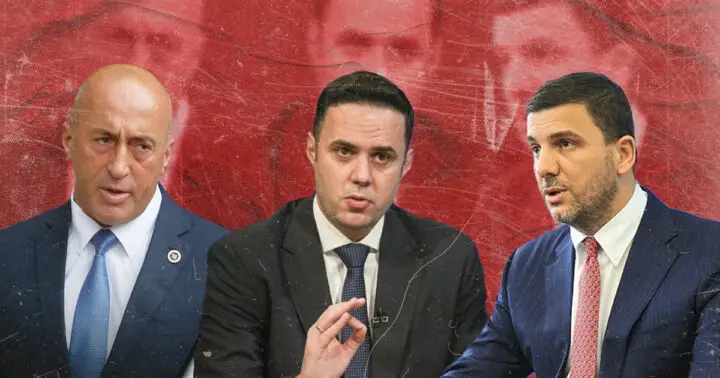The once-solid alliance of Kosovo’s former opposition bloc—made up of the Democratic Party of Kosovo (PDK) led by Memli Krasniqi, the Democratic League of Kosovo (LDK) led by Lumir Abdixhiku, and the Alliance for the Future of Kosovo (AAK) led by Ramush Haradinaj—appears to be showing serious cracks.
After months of jointly opposing the ruling Vetëvendosje (VV) movement, tensions came to the surface during and after the most recent parliamentary session, exposing deep divisions over strategy, cooperation, and political direction.
PDK and LDK Clash Over Voting Strategy
The rift became evident when the PDK announced it would not support any candidate for Speaker of Parliament coming from the outgoing government cabinet. The LDK went even further, with Abdixhiku and other officials refusing to back any Vetëvendosje candidate unless it was part of a broader political agreement.
In contrast, Haradinaj’s AAK initially declared it would vote only for Glauk Konjufca, Shqipe Selimi, and Saranda Bogujevci, but later softened its position, leaving open the possibility of supporting additional candidates.
This shift placed the three parties on different political tracks, undermining the coordination they had maintained for nearly seven months.
The Vote for Dimal Basha – A Turning Point
The key turning point was the vote for Dimal Basha as Speaker of Parliament. While AAK and most PDK deputies supported Basha, the LDK voted against him. Furthermore, when it came to electing the Deputy Speaker from the Serb community, Abdixhiku’s party abstained entirely, unlike PDK and AAK, which participated in the vote.
This move by the LDK was perceived by its former allies as a political blockade rather than a constructive strategy.
- Ramush Haradinaj openly criticized Abdixhiku, accusing him of “standing still” during the political crisis. “Only Lumir Abdixhiku and his group have cemented this blockade. Lumir has remained in place continuously and continues to remain there. Continue to stay in place, Lumir, since it suits you!” – Haradinaj wrote on Facebook (August 26, 2025).
- Meanwhile, Memli Krasniqi expressed disappointment at LDK’s inaction, commenting on Abdixhiku’s Facebook post: “We also wish for light one day, but sometimes you have to search for it. Every political leader must contribute. I hoped LDK, with its proclaimed institutional values, would give that contribution. Instead, they chose neither side and refused to vote.”
LDK’s Counterargument – Aiming Higher
For his part, Lumir Abdixhiku defended LDK’s stance, framing it as a principled choice rather than obstruction. After the vote, he argued that supporting Basha represented a victory of “ignorance over values,” insisting the LDK aspired to higher standards for Kosovo’s institutions.
“Kosova, as we had never imagined. A victory of ignorance and an unforgivable mistake by its supporters. This is their level; this is how they project the Republic.” – Abdixhiku on Facebook (August 26, 2025).
Serb List Dispute Deepens the Deadlock
The Serb List has also added fuel to the crisis, insisting on repeatedly nominating Slavko Simić as Deputy Speaker. On August 26, Simić was rejected in three separate votes, after which newly elected Speaker Dimal Basha declared that—based on a recent Constitutional Court ruling—the same candidate cannot be proposed more than three times.
The Serb List strongly objected, claiming the restriction applied only to Speaker elections, not to Deputy Speaker nominations. This legal dispute further complicates efforts to end the months-long institutional deadlock.
Kosovo Without Institutions for Over Six Months
Kosovo has now been without fully functioning institutions for more than six months. The constitutive parliamentary session that began on April 15, 2025, remains unresolved, leaving the country in a state of political paralysis.
The last session of the 8th legislature was held on December 5, 2024. In the February 9, 2025 elections, the results were as follows:
- Vetëvendosje (VV) – 42.3%
- PDK – 20.95%
- LDK – 18.27%
- AAK-Nisma coalition – 7.06%
Despite these results, the new parliament has yet to stabilize, as divisions within both the ruling party and the opposition block effective governance.
Conclusion – A Fragile Opposition Alliance
The recent public clashes between Memli Krasniqi, Lumir Abdixhiku, and Ramush Haradinaj suggest that the former opposition bloc is fractured, with little sign of immediate reconciliation.
While PDK and AAK appear more aligned, LDK’s refusal to compromise has left it isolated, drawing sharp criticism from its former partners. With Kosovo still locked in institutional paralysis, the opposition’s disunity only strengthens Vetëvendosje’s hand in the ongoing crisis.







